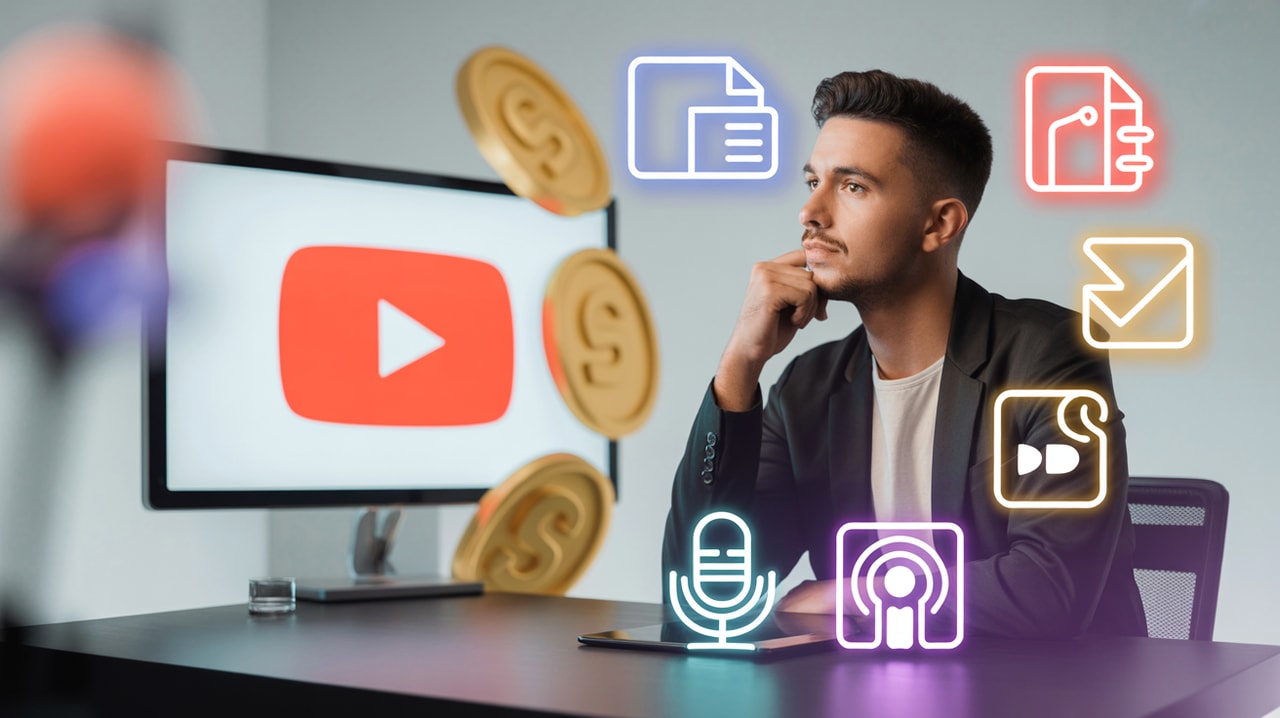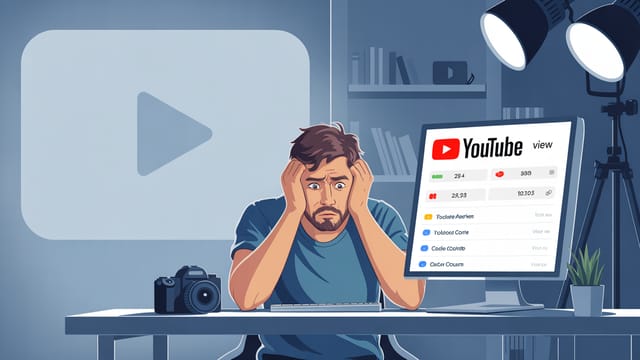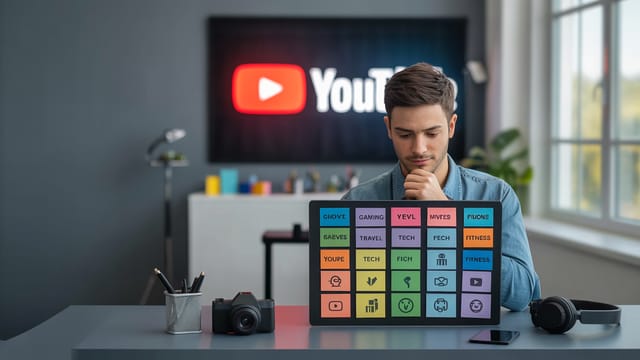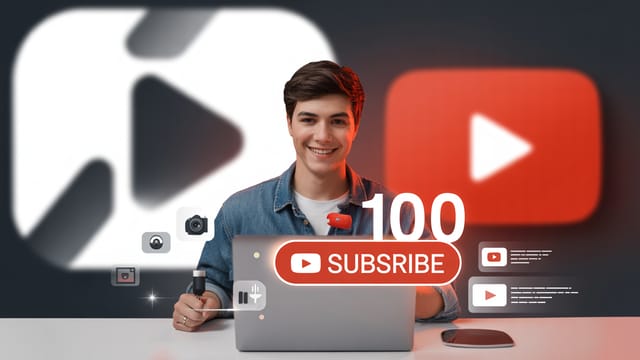
Ready to get your next 10,000 subscribers?
Join thousands of creators who use Subscribr to create faster, better YouTube videos.
Beyond AdSense: 7 Smart YouTube Monetization Strategies
For many creators, getting accepted into the YouTube Partner Program and turning on AdSense feels like the ultimate goal. And while AdSense revenue is a fantastic starting point, relying solely on it can leave you vulnerable to algorithm changes and fluctuating ad rates. If you're an early-stage monetized creator looking to build a more sustainable income, it's time to look beyond the yellow dollar signs.
This article is your roadmap to unlocking non-AdSense revenue streams. We'll explore seven smart strategies to diversify your income, leverage your engaged audience, and build a more robust YouTube business.
Why Relying Only on AdSense is Risky
The biggest pain point for many creators is the over-reliance on AdSense. Your income is tied directly to views and how advertisers value those views. This means a shift in YouTube's algorithm, a change in ad spending trends, or even a dip in your channel's viewership can significantly impact your earnings.
Diversifying your income streams isn't just about making more money; it's about building stability and control. By exploring other monetization methods, you reduce your dependence on a single source and create a more resilient business.
Leveraging Your Audience for Direct Monetization
The key to many of these alternative strategies lies in leveraging the engaged audience you've already built. Your subscribers aren't just viewers; they're a community who trusts your recommendations and values your content. This trust is a powerful asset you can use to generate income directly.
Here are seven smart YouTube monetization strategies beyond AdSense:
1. Affiliate Marketing: Recommending Products You Love
Affiliate marketing is one of the most accessible ways to start diversifying your income. It involves promoting products or services you genuinely use and recommend. When someone purchases through your unique affiliate link, you earn a commission.
This works particularly well if you review products, create tutorials using specific tools, or discuss products relevant to your niche. For example, a cooking channel can link to ingredients or kitchen gadgets, while a tech channel can link to the equipment they use.
Platforms like Amazon Associates (now Amazon Influencer) are popular starting points. YouTube Shopping also allows you to tag products directly in your videos and community posts, potentially offering higher commissions. Explore affiliate networks like Howl, Magic Links, and LTK, or even build direct relationships with brands for private affiliate programs.
A simple rule to adopt: if you talk about a product in a video, include a commissionable link in the description. Tools like Subscribr's Research Assistant can even help you research products and gather information to support your recommendations.
2. Selling Your Own Digital Products
Packaging your knowledge and expertise into digital products is a scalable way to generate income. These can include e-books, guides, templates, checklists, or mini-courses.
Think about the common questions your audience asks or the problems they're trying to solve. Can you create a downloadable resource that provides a solution? A fitness channel could create a workout plan PDF, a graphic design channel could offer template packs, or a productivity channel could sell a digital planner.
Digital products have low overhead once created and can be sold repeatedly. They offer a more direct way to monetize your most dedicated fans who are willing to pay for in-depth resources.
3. Creating and Selling Online Courses
If you have a significant amount of expertise to share, creating a comprehensive online course can be a lucrative option. This is particularly effective if you find yourself repeatedly answering the same questions or guiding people through a specific process.
An online course allows you to go deeper into a topic than you can in a YouTube video series. You can structure lessons, include exercises, and offer a more premium learning experience. Platforms like Teachable or Kajabi provide the tools to host and sell your courses.
Developing a course requires a significant upfront investment of time and effort, but it can provide a substantial and scalable income stream.
4. Offering Coaching or Consulting Services
If your niche involves sharing expertise or helping people achieve specific goals (like health coaching, business consulting, or skill development), offering one-on-one or group coaching sessions can be a natural extension of your content.
Your YouTube channel serves as a powerful platform to demonstrate your knowledge and build trust. Viewers who resonate with your content and see your expertise in action may be willing to pay for personalized guidance.
You can use tools like Calendly for scheduling and payment processing. Start with one-on-one sessions and potentially expand to group coaching as demand grows. This strategy directly leverages the authority you've built through your content.
5. Building a Membership Community
For channels with a highly engaged and loyal audience, creating a membership community can provide a consistent monthly recurring revenue stream. Platforms like Patreon or YouTube Channel Memberships allow you to offer exclusive content, perks, or community access to paying members.
This could include bonus videos, behind-the-scenes content, early access to videos, private Q&A sessions, or access to a private Discord server. Memberships are a great way to deepen your connection with your most dedicated fans while generating predictable income.
Consider hosting a membership on your own website for greater control over the platform and to avoid YouTube's 30% cut on channel memberships.
6. Merchandise and Physical Products
Selling branded merchandise (like t-shirts, mugs, or stickers) is a classic way to monetize your audience and build brand loyalty. If your channel has a strong visual identity or catchphrases, merchandise can be a popular option.
Beyond traditional merch, you can also curate and sell physical products relevant to your niche. An outdoor adventure channel could sell camping gear, or a coffee channel could sell unique coffee beans or accessories.
Services like Printful or Shopify can help you set up an online store and handle order fulfillment, making it easier to manage inventory and shipping.
7. Securing Brand Deals and Sponsorships
As your channel grows and you build an engaged audience, brands in your niche may be interested in partnering with you for sponsored content. This involves creating videos that promote a brand's product or service in exchange for payment.
Brand deals can be a significant income source, but it's crucial to be selective and only partner with brands you genuinely believe in and whose products are relevant to your audience. Authenticity is key to maintaining your viewers' trust.
You can proactively reach out to brands or work with influencer marketing platforms to find sponsorship opportunities.
Building Your Monetization Roadmap
Diversifying your income streams doesn't mean you need to implement all seven strategies at once. Start with one or two that align best with your content, audience, and capacity.
Many creators find success by starting with affiliate marketing and perhaps a small digital product. As your channel grows and you gain more experience, you can strategically layer in other income streams. Building an email list through a lead magnet is also a valuable step, allowing you to communicate directly with your most engaged viewers and promote your various monetization offers.
Subscribr's Channel Intelligence system can help you analyze your channel's performance and identify patterns that might inform your monetization strategy. By understanding what resonates with your audience, you can tailor your offers to their specific needs and interests.
Remember, building a sustainable YouTube business is about more than just chasing views for AdSense. It's about creating valuable content, building a strong community, and strategically offering products and services that serve your audience while providing you with financial stability. Explore these strategies, experiment with what works best for your channel, and take control of your income.





